When it was first announced that the famously twice-canceled cult comedy Arrested Development was coming back with a fourth season produced and distributed by Netflix—way back in 2013, when streaming originals as a whole were still a new, unproven concept—reactions from fans were mixed. While there was a sizable contingent that was naturally excited for the revival of a series we all felt had been misunderstood and mishandled by its own network of origin, others were less enthused.
For the last ten or more years, I’ve vividly remembered an exchange I had with my old friend John. He was concerned that the new season likely wouldn’t be up to the standard of the original three—Ron Howard voice: it wasn’t—and that this would effectively ruin the series.
The first part of that worry was not unfounded, given that fans already viewed the third season as a bit of a decline from the acerbic, whip-smart comedic heights of the instant-classic first two. History also vindicated this prognostication, as pretty much no one anywhere ended up considering the strange, alien fourth season to be on the originals’ level.
But I offered my friend a reassurance to the latter part of his concern. To paraphrase myself:
“The way I’m trying to look at it is that we’ll always have the first three seasons, and nothing will take that away. So the new stuff we get is gravy: even if it’s awful, it doesn’t actually change anything.”
Every single part of that statement was wrong.
Welcome back to Sin’s Soapbox, where every Friday I reflect on the TV I’m watching or thinking about. Our debut installment on The Last of Us was up to the minute and highly topical, while this week’s is a remember-me-now on the huge mistakes made by a once great show that blue itself.
Strap in, friends. It’s gonna be a bumpy ride.
The remainder of this article contains ***SPOILERS*** for all of Arrested Development.
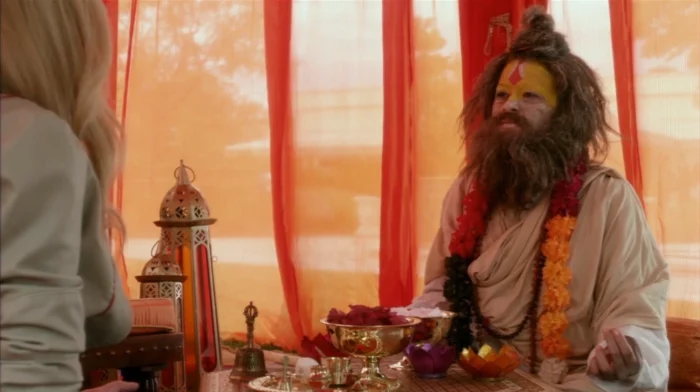
With the announcement that Netflix was taking down Arrested Development—both the two Netflix-produced seasons and the original three—I decided it was time to finally catch up on the last two. As a diehard fan of the series, I had of course watched the first Netflix-original installment at the time it was released, but creator Mitchell Hurwitz has since recut the infamous nonlinear 15-episode season into a more linear 22-episode edit called “Season 4 Remix: Fateful Consequences.” (In a funny little foreshadowing of today’s trend of streamers taking down content we took for granted as permanent, Netflix removed the original iteration of S4 off the service entirely when the Remix was released—a decision I have always vehemently disagreed with.)
I’ve already posted a reaction to Arrested Development Season 4 Remix on social media, but to summarize: the micro-level writing is sharper than you remember; on a macro level, the mazelike nonlinear structure of the original S4 was in retrospect the coolest thing about it; and oh boy is this shit unbelievably offensive.
We’ll be coming back to that last point. For now what I want you to take away from my analysis of S4, in relation to the final season, is that although revisiting it through the re-edit left me dismayed at the franchise’s tendency toward insensitive portrayals of marginalized groups, it honestly gave me a renewed appreciation for the original edit’s creative audacity.
There was a madcap flair, a kind of admirably unhinged confidence—and an impressively titanic effort—baked into the convoluted initial presentation of S4’s story, which arose in response to the difficulties of scheduling a cast that had all become breakout stars because of the very same show. As confusing as it may have felt at the time—and as toxic as so much of its content feels now—the character dynamics and the jokes themselves (when not needlessly cruel) do still land with serious punch.
In short, Season 4 left Arrested Development in a conflicted place: while it did put a bad taste in the mouth of many fans—and concluded with a highly controversial moment where the lovable George Michael righteously, but weakly, punches his overbearing father in the face—I don’t feel it “ruined” the series or its legacy.
That would be Season 5’s job.
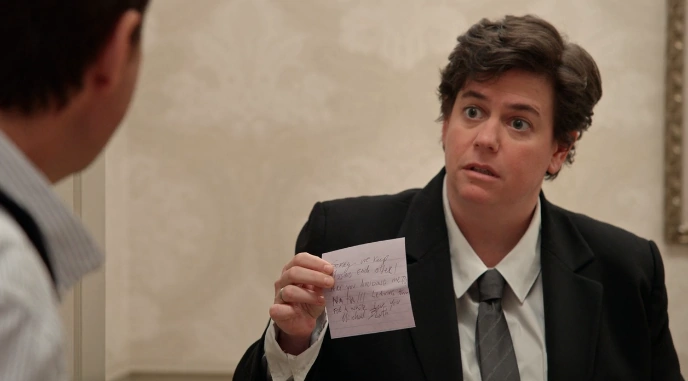
The first thing that needs to be said about Arrested Development Season 5is that it’s a structural mess on both macro and micro levels. It for some reason inherits S4 Remix’s penchant for unskippable, in-episode, often rapid-fire infodump recaps that just aren’t necessary—because the plot this time around isn’t really that complicated, and I mean that in a bad way. If anything, this new feature highlights how bland and unengaging the story is, often making me miss the, if nothing else, comically absurd complicatedness of S4’s plotting.
The season also employs a shockingly egregious amount of noticeable ADR—”automated dialogue replacement,” or filmmaker jargon for when you re-record line readings after the fact in a sound booth and dub them over the original picture (as opposed to fully re-shooting a scene that has some issues). Typically a sign of audio or acting problems in the original footage, ADR is something that’s very hard to conceal well and generally should be used sparingly. This season of Arrested uses it far, far too liberally, which only makes it more and more noticeable and immersion-breaking over time; in the back half of the season, which was released separately from the first half, it feels like it’s used in nearly every scene.
Having worked on plenty of video productions, what this says to me is that the shooting schedule was almost certainly rushed. Overreliance on ADR tends to arise from budgeting, scheduling, or interpersonal difficulties on a set, which are some of the most common factors that limit how much time a director and their cast can spend rehearsing and/or how many alternative takes can get filmed per scene. Of course, it could also just be a sign of carelessness and inattention to detail during production, and a similarly lax pursuit of quick fixes in post-production for the problems that result from that.
Whatever the cause of this glut of overdubbed audio, this is one of the ways the season sheds an unfortunate light on the series as a whole. The more I cringed at obvious, out-of-place line readings—or even extra jokes that appear to have been crammed in after the fact by jamming “wild” (non-synced) studio audio into the mouths of characters who are offscreen, often squeezed in too tightly after a scene’s last actual punchline—the more I was forced to admit that these were problems the series has always had.
On some level, I was already aware that Arrested Development has always been a little too comfortable with corner-cutting approaches like ADR, and vaguely desperate moves like joke-cramming in post—but Season 5 takes these poor modes of craft to such an extreme that I could no longer look away; no longer ignore the fact that I’ve noticed it many times in the prior four seasons.
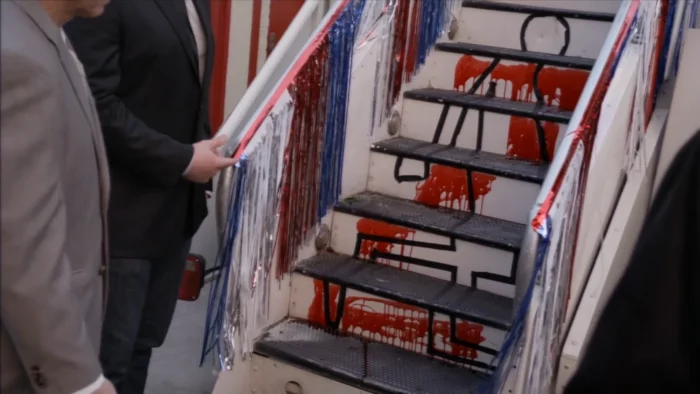
Ostensibly a sort of murder mystery following up on the unexplained death of “Lucille 2” Austero—one of several loose ends intentionally left hanging at the end of S4 because the hopes of an Arrested Development feature film were still alive—the season doesn’t actually play anything like a mystery. The plotline surrounding the disappearance of Lucille 2 and subsequent disappearance of prime suspect Buster Bluth is ever-present, but it never connects with any sense of stakes or real consequences. The question of what happened to Lucille 2 always feels like a distant, intellectual abstraction: we’re aware of it, sure—but nothing about the writing or execution of the season takes it seriously it as a matter of mood, style, or genuine curiosity.
Flat new characters appear and disappear with no rhyme or reason, like the inexplicably named homicide cop Lieutenant Toddler, who’s set up to be an important recurring nuisance in the Bluths’ lives…and then vanishes completely. Or the just plain annoying Dusty Radler—a gross misuse of capable guest Dermot Mulroney—who goes from an overgrown beach bum and paramour for Lucille Bluth to a blubbering manchild lawyer in his arbitrarily scattered appearances, none of which are ever interesting or have any serious story significance.
The worst instance of this pattern is the disappearance of Lindsay Bluth, who walks offscreen in an Episode 4 scene with a nonchalance that in no way signals it’s her total departure from the story. An episode or two later, the other Bluths start—and never fucking stop—talking about Lindsay’s apparent mysterious disappearance from her electoral campaign, as if it had already been made clear to us that this had taken place. And even prior to that, eagle-eyed fans (the only kind this show has) had already noticed Lindsay seemed to be inexplicably greenscreened into certain scenes.
As with the nonlinear nature of Season 4, the origin of this choice is real-world logistics: Portia de Rossi had retired from acting between the production of Seasons 4 and 5—and Hurwitz, despite fully knowing this, decided to write her character into five of the new episodes anyway (the first four, plus a return in the finale). Graciously, the wonderful de Rossi agreed to appear in these five episodes as her swan song as an actor—oof—but even given that limitation on the character’s involvement in the plot, the final product’s solutions to this problem remain simply baffling. This necessarily adds to the aforementioned sense of corner-cutting and inattention to detail—not least of all because the remainder of the season finds absolutely no story use whatsoever for Lindsay’s ever-estranged husband Tobias, set adrift without her around to serve as his foil and/or motivation.
The Fünke family does provide perhaps the one persistent bright spot in the season: born grifter Maeby decides to live full-time in her latest disguise, enjoying the slow life as a pitch-perfect senior citizen persona she dubs Annette. Maeby, played by the great Alia Shawkat, has always been one of my favorite parts of the show; unfortunately, one enjoyable thread alone can’t save a season—and like nearly everything else, it has next to nothing to do with…anything else.
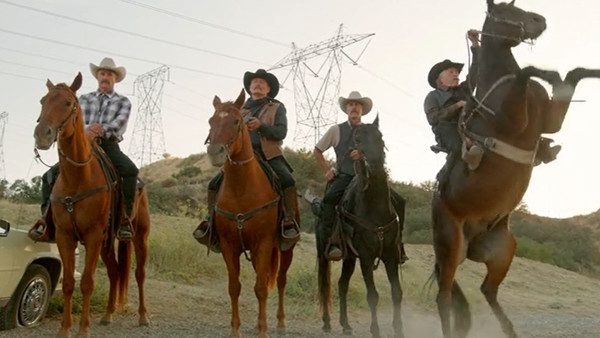
While this season manages to avoid the previous one’s excess of racist, ableist, homophobic, and transmisogynistic caricatures, it still has its own representational problems. I don’t love the “Mexican Romneys,” a group of what appear to be mostly white actors putting on tropey Mexican accents, in order to play some Mexican-born cowboys from the Romney extended family.
And in the process of portraying Lindsay’s campaign as a parallel to Trump’s—and the always regressive Bluth elders as the archetypical rich, ignorant Trump voters—the season flirts a few times with actually reiterating bigotry while trying to skewer it via depiction. When George, Sr. and Lucille describe the Mexican (and Chinese) Romneys in contrast to “the regular Romneys,” it’s reasonably clear that the butt of the joke is the Bluths and their racism. But it takes more pre-existing nuance and cultural awareness on the part of audience members to come to this same conclusion—and be laughing “for the right reasons”—when they repeatedly express anxiety about how to interpret their Chinese business partners’ reserved expressions, in an instance of the “Asian inscrutability” trope.
I’m willing to give a partial pass to the ongoing, vaguely troubling “Are they even gay?” love-ish story between GOB and Tony Wonder mainly because it’s actually played with surprising humanity by both actors, at least compared to the series’s perennial running gag of having Tobias make an endless barrage of Freudian slips that suggest he’s deeply closeted.
I’m less forgiving of the choice to bring back Season 4’s cruelly named DeBrie—as in, “debris”—who is thankfully used more sparingly here, but remains a harmful caricature of addiction sufferers, sex workers, and unhoused people. I don’t necessarily begrudge the talented and thoughtful comedian Maria Bamford for taking a high-profile gig like this again, especially when it was the breakout role that launched her career—but the thin writing she’s given to work with doesn’t really manage to transcend the ableism and classism baked into the character’s conception.
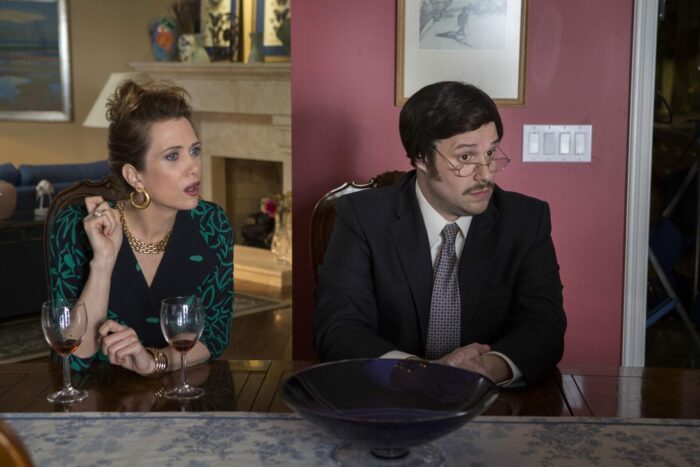
The season’s worst choices arrive late in the game. Just when things should be picking up steam and building tension toward a climax, instead the season rambles its way through a bunch of material steeped in the deadly mix of confusing and boring.
The most excruciating viewing experiences of the entirety of Arrested Development come in the form of a series of unsettling, lifeless flashbacks to the childhood era of Michael and his siblings—executed without bringing back inspired Season 4 stunt cameos Seth Rogen and Kristen Wiig, who were hilarious as the younger versions of their parents. These scenes border on uncanny valley levels of eeriness and are inexplicably scored like a gloomy, aggressively mediocre TV drama.
After several episodes of wondering why we’re being forced to watch these painfully dry, awkwardly constructed, story-irrelevant asides, it’s revealed that they’re meant to represent the end product of the Ron Howard-produced streaming series about the Bluths that Michael ran around collecting signatures for in Season 4. That is—in a typically sly, playful barb at the show’s iconic narrator and actual executive producer Howard—it’s intentionally done in the style of a gloomy, aggressively mediocre TV drama.
The problem is that we’re expected to watch several minutes apiece of it, in each of several episodes in a row, all before being clued in on the actual joke going on in it—which is to say, the show expects us to wait patiently through intentionally unwatchable content for a punchline we literally don’t know is being set up through it.
AD has more successfully pulled off that kind of self-referential, charmingly antagonistic premise before. In other words, there is a way to do something like this right—and this ain’t it. Perhaps if the flashbacks had played less like a straight-up recreation of unwatchable TV and more like a comical, absurd exaggeration of unwatchable TV, we’d actually feel rewarded—rather than actively punished—upon the eventual revelation of its nature.
Bluntly, I’m on the verge of saying this execution is straight-up disrespectful to the audience’s time.
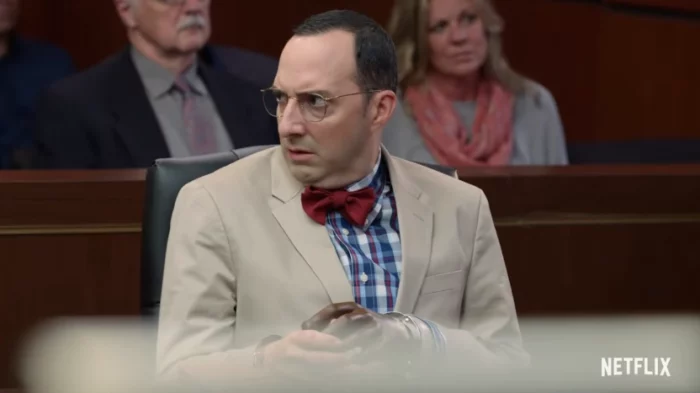
And then there’s the eventual ending, which sees everything fans disliked about The Punch and raises it infinity, courageously determined to end on a note that cannot possibly be enjoyed: in a throwaway beat that isn’t even delivered with any comedic impact, crammed into the actual final minute of the entire series, Buster Bluth just casually admits that he did murder Lucille 2 after all.
Both plotwise and in terms of character dynamics and recurring themes, it’s admittedly probably the only solution that really makes sense—to a non-mystery that the show itself never really cared about. Just like how the eerie flashbacks pay off a joke that was never set up, it comes at us so out of nowhere—after a season where there was never any sense of emotional reality around the gravity of the premise, and at a point where we’re exhausted and just plain don’t need the answer anymore—it truly does singlehandedly destroy any coherence left in the show’s world.
At minimum, it obviously puts an uncomfortable, genuinely disturbing spin on a character who’s always been lovable, sympathetic, and an object of pity. Again, there’s a way to do something like this right—and that Right Way probably would have entailed much more stylistic and plot emphasis on the mystery; a decent amount of setup and emotional preparation for the possibility that Buster (or any character we like) might actually have committed a premeditated murder; and literally any amount of time after the revelation, in which we could decompress from the shock and process (or at least lighten up) the dark, drastically altered reality in which it leaves the literal whole series, probably forever.
Now we have to go on knowing that, even in Seasons 1-3 when we revisit them, Buster—the poor, hapless Motherboy and perhaps the only semi-innocent Bluth—always had the potential for murder.
And so we arrive at the conclusion of what has been, for me, a ten-year process of realization: yes, new content can ruin a work and its legacy. It can even actually make the previous work worse.
Where Season 4 hurt the show’s legacy by taking its insensitivity about real-world social issues to undeniable extremes, Season 5 tarnishes what’s left of it by highlighting a history of cutting corners—and leaving nearly everything we loved about the original series shattered and stripped away.
It also isn’t funny.

